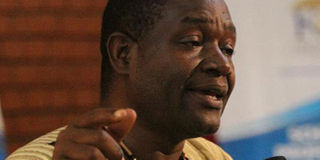Activist, ex-political detainee Onyango Oloo dies

Former political detainee and human rights activist Onyango Oloo. Mr Oloo died on Sunday, June 16, 2019 in Nakuru, his family said. PHOTO | COURTESY
What you need to know:
- Early this year, Oloo opened up about his HIV status and retreated to his village in Kakamega County to continue his activism as a rural-based activist.
Dozens of human rights defenders took to WhatsApp groups, Accountability Demand Net and Kenya Liberation Struggle, where they eulogized him for his gallantry.
Mr Oloo was among the first batch of students to be arrested following the 1982 coup attempt.
Human rights activist, writer and former political detainee Onyango Oloo has died.
On Monday, the activist's sister Ms Ruth Oloo said he died in Nakuru on Sunday night.
The founder of Jukwaa political blog, who was tortured at Nyayo House torture chambers, had travelled to Nakuru to pick up 15 copies of Miguna Miguna's book, Treason, a gift he had been sent from Canada.
“Please hold our hands in this time of need and give OO (Onyango Oloo) a befitting send off. Thank you so much for your love and support. Unfortunately the Miguna books that brought him here were never to reach him. To any he might have rubbed the wrong way, we ask for forgiveness on his behalf,” the sister wrote in an email sent to friends and activists.

A youthful Onyango Oloo being taken to court after the 1982 attempted coup. He was among the first batch of university students arrested following the coup attempt by members of the Kenya Air Force. PHOTO | COURTESY
HIV STATUS
Early this year, Oloo opened up about his HIV status and announced that he was retreating to his home village in Luanda Didi in Kakamega County to continue his activism as a rural-based HIV-positive activist.
Despite his prominence as an activist and former political detainee, Mr Oloo died a poor man with many civil society activists telling Nation that the country let one of its most passionate and dedicated human rights activists down.
“Onyango Oloo is no more. Very sad turn of events in the last two years for my brother. A true soldier of justice,” activist Cyprian Nyamwamu wrote.
Dozens of human rights defenders took to WhatsApp groups, Accountability Demand Net and Kenya Liberation Struggle, where they eulogized him for his gallantry.
“We all did the little we could at different times. But yes, there is more that we could have done,” Sunday Nation columnist Isaac Amuke said.

Human rights activist Onyango Oloo. His family said he died in Nakuru where he had gone to pick up a gift of books sent from Canada by Miguna Miguna. PHOTO | COURTESY
1982 COUP
Mr Oloo was among the first batch of students to be arrested following the 1982 coup attempt.
The others were Titus Adungosi (who later died in prison), Jeff Mwangi, Ongele Opala, Muga K’Olale , Wahinya Bore, Paddy Onyango, Joseph Hongo, Maurice Adongo Ogony, Onyango C. A., Oginga Ogego, Francis Kinyua, Thomas Mutuse and Johnstone Simiyu.
By the time of his arrest, Mr Oloo was a first year history student at the University of Nairobi. He was sentenced on November 1, 1982 to 15 years in prison, five for each count he was convicted of, namely: being in possession of subversive literature and two counts of subversion. The sentences ran concurrently.
“The most memorable of the student trials was that of a University of Nairobi freshman Onyango Oloo, who eventually defended himself in court, having rejected plea bargains for a short sentence from his attorney Richard Kwach on the principled bases that he was not guilty of any crime. Sixty-seven other students were held in remand prison from August 1982 until March 1983,” the book Ethnicity and Democracy in Africa notes.
His fellow prisoners included Maina wa Kinyatti, Gitobu Imanyara, Karuga Wandai, David Murathe, Kimani Wanyoike and Tirop Kitur.
PRISONER CONSCIENCE
Amnesty International took up his case in 1986 after the organisation admitted him as a prisoner of conscience.
His imprisonment and fight for justice created precedence in the doctrine of natural justice after he petitioned against a decision by the Commissioner of Prisons who wrote to the Office-In-Charge of Kamiti Maximum Prison directing that Mr Oloo be deprived of all remission.
Whereas the High Court found out that Mr Oloo had not committed any prison offence and that he had not been informed what wrong he had done or given an opportunity to state why he should be deprived of his remission, the court nonetheless sided with the Commissioner of Prisons.
Later on, the Court of Appeal agreed that Mr Oloo deserved a remission of his jail term by 20 months before the expiry of his sentence.
After leaving prison, he went into exile in Tanzania from where he joined Mwakenya activists among them Kaara Macharia, Kishushe Mzirai, Adongo Ogony, Gicheha Mungai, Njuguna Mutahi, Gitau Wanguthi, Kibachia Gatu, Kinyua Rungurwa, Nduati Macharia, Stephen Karanja , Omondi Kabir, James Mwangi Kwirikia and Githirwa Muhoro to push for multi-party politics.
Rateng’ Oginga Ogego went to Uganda. Mwandawiro Mghanga went to Norway via Uganda.
Adongo, Oloo, Muhoro, Mwangi and Omondi Obanda were granted asylum in Canada in November 1988.
From Tanzania, Oloo left for exile in Canada in November 1988, where he stayed for several years.
Mr Oloo leaves behind a wife and a child. He was 59.





